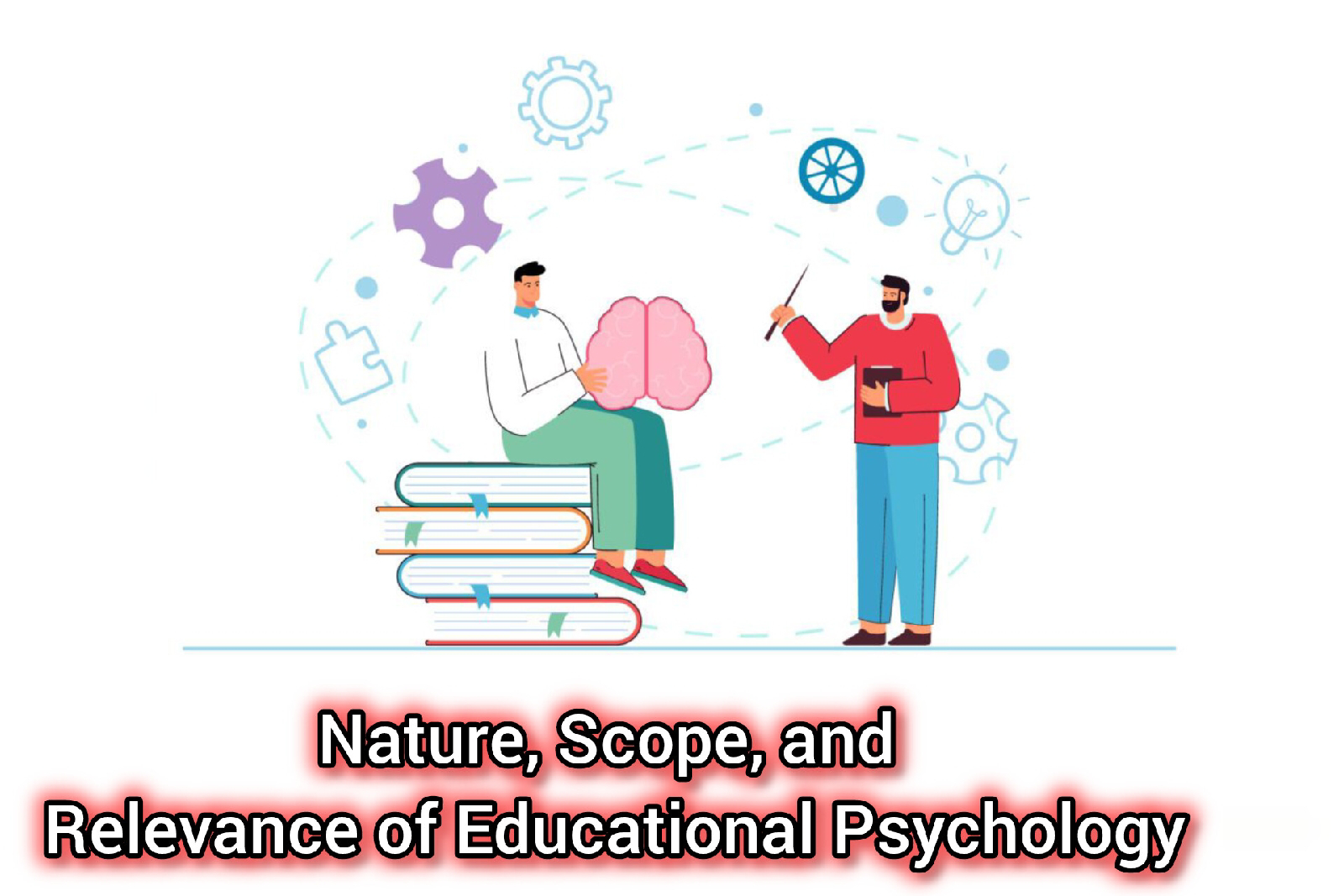Educational psychology is a branch of psychology that studies how people learn in educational settings, the effectiveness of educational interventions, the psychology of teaching, and the social psychology of schools. It seeks to understand and improve the learning process to benefit learners, educators, and society.
Nature of Educational Psychology
Educational psychology integrates theories and practices from various domains of psychology to understand learning behaviours, motivations, and challenges. Its key characteristics include:
1. Scientific Nature:
Educational psychology employs empirical methods to study behaviour, cognition, and emotional development in educational settings. For instance, Bandura's Social Learning Theory uses observational methods to explore how children learn through imitation.
2. Applied Nature:
This field bridges the gap between theoretical knowledge and practical application, helping educators tailor teaching strategies to individual needs.
3. Interdisciplinary Approach:
Educational psychology draws insights from cognitive psychology, developmental psychology, and sociology to understand the learner holistically.
4. Dynamic and Evolving:
With advancements in technology and changes in educational paradigms, educational psychology evolves to address contemporary challenges, such as integrating AI in classrooms or understanding the psychological impact of online learning.
Scope of Educational Psychology
The scope of educational psychology is vast, encompassing various domains and applications:
1. Understanding the Learner:
Developmental Psychology: Helps in understanding the cognitive, emotional, and social development stages of learners. For example, Piaget’s Cognitive Development Theory outlines how children think differently at various ages.
Individual Differences: Recognizes that every learner has unique abilities, interests, and challenges. Tools like Gardner's Multiple Intelligences Theory aids in identifying diverse learning styles.
2. Learning Processes:
Studies how learners acquire, process, and retain information. Behaviourist theories like Skinner's Operant Conditioning emphasize reinforcement in learning, while constructivist approaches like Vygotsky's emphasize social interaction and scaffolding.
3. Teaching Methods and Pedagogy:
Educational psychology provides insights into effective teaching strategies, classroom management, and instructional design. For instance, active learning methods, such as group discussions and problem-solving tasks, are rooted in psychological principles.
4. Assessment and Evaluation:
Focuses on designing fair and effective assessment tools that measure both cognitive and non-cognitive skills. Techniques like formative assessments and adaptive testing are informed by educational psychology.
5. Addressing Special Needs:
It aids in identifying and supporting learners with special educational needs (SEN). Techniques such as Individualized Education Plans (IEPs) are informed by psychological assessments and interventions.
6. Educational Technology:
Explores how tools like virtual reality (VR) and learning management systems (LMS) influence learning outcomes.
Relevance of Educational Psychology
Educational psychology plays a critical role in addressing the diverse challenges of modern education:
1. Enhancing Teaching and Learning:
By understanding learning processes, teachers can adapt their methods to suit different learners. For example, using Bloom's Taxonomy, educators can design lessons that promote higher-order thinking skills.
2. Motivation and Engagement:
Theories like Maslow's Hierarchy of Needs emphasize the importance of fulfilling basic and psychological needs for optimal learning. Strategies such as gamification in classrooms leverage intrinsic and extrinsic motivators.
3. Mental Health Support:
Educational psychologists help identify and address issues like anxiety, ADHD, or learning disabilities that hinder academic success. For example, mindfulness programs in schools have been shown to reduce stress and improve focus.
4. Policy Making:
Research in educational psychology informs policies on curriculum design, teacher training, and inclusive education. For instance, the National Education Policy 2020 in India emphasizes experiential learning and holistic development, aligning with psychological principles.
5. Preparing for the Future:
With the rise of automation and AI, educational psychology helps design curricula that foster critical thinking, creativity, and emotional intelligence, skills essential for the 21st century.
Examples and Research
1. Classroom Example:
A teacher notices a student struggling with reading comprehension. Applying Vygotsky's Zone of Proximal Development, the teacher provides scaffolding through guided reading sessions and gradually reduces support as the student becomes proficient.
2. Research Example:
A 2020 study published in the Journal of Educational Psychology explored the impact of collaborative learning on student performance. The findings showed that students in collaborative settings scored 15% higher on assessments than those in traditional classrooms, emphasizing the importance of social interaction in learning.
3. Special Needs Example:
A school uses educational psychology to implement Universal Design for Learning (UDL), ensuring that lessons are accessible to all students, including those with dyslexia or hearing impairments.
Conclusion
Educational psychology is indispensable for fostering effective learning environments. Its insights into human behaviour, cognitive processes, and social interactions equip educators to address diverse learner needs. By embracing its principles, educational institutions can ensure holistic development, bridging the gap between theory and practice to prepare learners for a rapidly changing world.






















.jpg)




No comments:
Post a Comment